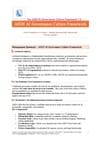⚡ Quick Summary
The AIGN AI Governance Culture Framework zeroes in on a critical but underdeveloped piece of AI governance: culture. Produced by the Artificial Intelligence Governance Network, this guide shifts focus from rules and structures to the behavioral norms, values, and incentives that define how AI decisions are actually made on the ground. It’s aimed at organizations struggling to make responsible AI principles stick—moving beyond performative ethics to embedded, lived practices. The framework offers 7 cultural levers (e.g. leadership behaviors, team rituals, peer recognition), practical assessments, and use cases that tie culture to risk mitigation and accountability. In short: it’s a manual for leaders who want to align people, not just policies.
🧩 What’s Covered
The document introduces a structured framework for cultivating a culture that supports safe, ethical, and effective AI development and deployment. It includes:
- The Case for CultureThe opening section makes a clear argument: compliance is necessary, but not sufficient. Without an enabling culture, responsible AI efforts stall or get bypassed. The authors cite examples from healthcare, finance, and tech where gaps in internal incentives, decision-making autonomy, or leadership tone led to AI governance failures—despite policies being in place.
- The 7 Cultural LeversEach lever is presented with indicators and sample interventions:Each section includes red flags (e.g. “Governance only lives in compliance teams”) and recommended interventions (e.g. “Make AI ethics part of OKRs”).
- Leadership Alignment: How C-level sets AI tone, walks the talk
- Values & Purpose: Reframing AI risk mitigation as value creation
- Team Practices & Rituals: Retrospectives, pre-mortems, escalation huddles
- Cross-Functional Collaboration: Bridging policy, legal, and ML teams
- Incentives & Recognition: Rewarding ethical choices and raising concerns
- Learning & Fluency: Embedding AI governance in onboarding, L&D
- Transparency & Feedback: Open forums, anonymous channels, action loops
- Application TemplatesThe guide offers:
- A culture audit tool with diagnostic questions for each lever
- Sample metrics (e.g., % of AI projects with documented escalation)
- Maturity indicators (basic to embedded)
- Use case spotlights (e.g. how one public-sector agency aligned incentives to reduce algorithmic bias)
- Culture as a Risk ControlImportantly, the authors make the case for treating culture as a first-order AI risk mitigant—something to audit, report on, and bake into assurance frameworks.
💡 Why it matters?
Policies don’t shape behavior—people do. And people operate inside norms, expectations, and informal signals. This guide gives organizations a tangible way to treat culture as part of their AI governance architecture. It’s also timely: the EU AI Act explicitly references culture and training, and ISO 42001 includes organizational context and awareness-building as key elements. This framework offers a way to bring those standards to life.
❓ What’s Missing
- Executive Buy-in Strategies: Lacks step-by-step advice on securing support from skeptical leadership.
- Global/Regional Variants: Doesn’t address how cultural levers differ across cultural contexts (e.g., Japan vs. US).
- Integration with External Audits: Limited guidance on how cultural assessments feed into third-party assurance or regulatory reviews.
👥 Best For
- AI Governance Leads looking to build internal momentum
- Ethics & Compliance Officers seeking culture-driven metrics
- HR and L&D teams integrating responsible AI into training
- Policy and Comms teams managing internal narratives around AI
- Tech leaders aiming to align agile teams with governance goals
📄 Source Details
Title: AIGN AI Governance Culture Framework
Publisher: Artificial Intelligence Governance Network (AIGN)
Date: July 2025
Length: 26 pages
Format: PDF handbook + self-assessment tool
Website: aigovernancenetwork.org
📝 Thanks to
The team at AIGN for framing culture not as an afterthought, but as a control surface. Special thanks to contributors from DeepMind, Monash University, and Deutsche Telekom who helped translate theory into practical levers.


